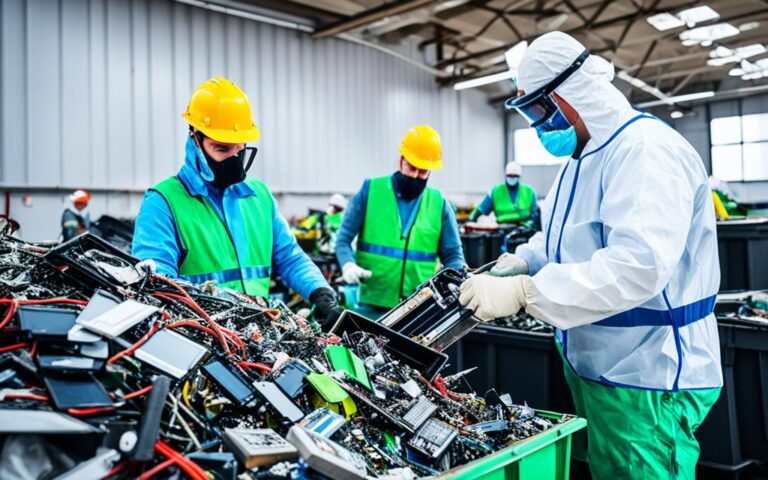Ethical Dimensions of Computer Recycling
In today’s technology-driven world, the issue of ethical computer recycling has gained paramount importance. As technology advances and the amount of e-waste generated continues to grow, it is crucial that we address the ethical dimensions surrounding the disposal of electronic devices. Raising awareness about the impact of improper electronic waste disposal on the environment is key to promoting responsible practices.
In the United Kingdom (UK), the environmental consequences of improper computer recycling cannot be ignored. Around 130,000 electronic devices are discarded each day, contributing to the staggering 50 million tons of e-waste generated globally every year. Such disposal practices can lead to contamination of soil, water, and air, posing a threat to our natural resources and ecosystems.
In addition to the environmental impact, it’s essential to recognize the ethical implications of current waste management practices. Often, e-waste is shipped to developing countries, where workers are exposed to hazardous chemicals during the disassembling process. This compromises their health and highlights the urgency of implementing ethical electronics recycling practices.
To mitigate the environmental and ethical concerns associated with computer recycling, it is vital to prioritize responsible disposal and reduce harm to both the environment and people. By embracing ethical computer recycling practices, we can protect our planet, conserve valuable resources, and pave the way for a more sustainable future.
The State of Electronics Recycling Today
E-waste, which includes discarded electronic devices, accounts for approximately 8% of global municipal waste, resulting in an estimated 50 million tons of e-waste generated annually. In the United States alone, more than 1 million cell phones are dumped each year. The worldwide generation of e-waste is estimated to range from 20 to 50 million tons annually.
Unfortunately, a significant portion of e-waste is not disposed of correctly and ends up being shipped to third-world countries. This improper disposal exposes workers to hazardous chemicals like mercury and lead. The lack of ethical electronics recycling practices can be attributed to issues such as improper waste segregation, mislabeling, and illegal waste disposal.
The consequences of these practices are severe. Improperly disposed e-waste leads to environmental damage and poses significant health risks to workers. Additionally, the socio-economic aspect of e-waste must be taken into consideration. Many impoverished communities in developing countries rely on e-waste as a source of income.
To address the ethical dimensions of e-waste, it is essential to consider waste management practices along with the industrial, financial, and ethical aspects involved. Implementing responsible recycling mechanisms and ensuring proper disposal are crucial steps toward mitigating the environmental and health hazards associated with e-waste.
Key Points:
- E-waste accounts for approximately 8% of global municipal waste.
- An estimated 50 million tons of e-waste is generated annually.
- Improper disposal exposes workers to hazardous chemicals.
- Lack of ethical electronics recycling practices contributes to environmental damage.
- E-waste is a source of income for impoverished communities in developing countries.
Ethical Electronics Recycling in Action
To address the e-waste problem, ethical electronics recycling practices should be implemented. One example is the sustainability program at Santa Clara University in California, which operates under the “Three C’s”: Competence, Conscience, and Compassion.
Competence involves understanding e-waste, electronics recycling, and the need for ethical practices. It requires knowledge of proper recycling methods and the environmental impact of irresponsible disposal.
Conscience emphasizes individual environmental responsibility. It encourages individuals to recognize the impact of their daily lifestyles on the environment and make conscious choices to minimize their environmental footprint.
Compassion highlights the collective effort required to tackle e-waste issues and care for communities affected by improper e-waste management. It emphasizes the importance of supporting ethical electronics recycling practices that prioritize the well-being of both the environment and people.
Individuals can also contribute to ethical electronics recycling by reducing, repairing, and ultimately recycling their electronics. Minimizing e-waste through conscious purchasing, repairing broken electronics instead of discarding them, and ensuring proper recycling are important steps toward ethical practices.
The Three C’s of Ethical Electronics Recycling:
- Competence: Understand e-waste and ethical practices
- Conscience: Recognize individual environmental responsibility
- Compassion: Support collective efforts and care for affected communities
By implementing ethical electronics recycling practices and promoting awareness through programs like the sustainability program at Santa Clara University, we can create a more sustainable future and address the e-waste challenge.
Measuring and Communicating Environmental Impact
Measuring and communicating environmental impact is crucial for companies to identify areas of excessive impact and make informed decisions for improvement. By tracking key performance indicators (KPIs), companies can monitor their carbon footprint, water consumption, energy inefficiencies, and waste management practices.
Tracking environmental impact allows companies to meet the growing demand for sustainability-conscious products and services and comply with regulatory requirements. It provides them with valuable insights into their environmental performance and opportunities for optimization.
Communication of environmental impact can be effectively achieved through various tools, including life cycle assessments, eco-efficiency systems, and environmental impact reports. These tools allow companies to present a transparent account of the metrics followed, improvements made, and progress achieved in reducing their environmental impact.
“Measuring and tracking environmental impact is vital for companies to understand and address their environmental footprint. It enables informed decision-making, drives sustainability efforts, and enhances corporate responsibility.”
Environmental impact reports, in particular, provide a comprehensive overview of a company’s environmental performance. These reports showcase key data, targets, and achievements related to environmental impact reduction. They offer stakeholders valuable insights into a company’s sustainability commitment and progress.
To effectively communicate their environmental impact, companies should consider the needs and expectations of their stakeholders. Providing periodic updates and engaging stakeholders in sustainability-related initiatives can help build trust and foster long-term partnerships.
The Importance of Key Performance Indicators
Key performance indicators (KPIs) offer quantifiable metrics that allow companies to assess their environmental performance objectively. Below are some common KPIs used to measure environmental impact:
| KPI | Description |
|---|---|
| Carbon Footprint | Measure of greenhouse gas emissions produced directly or indirectly by an organization |
| Water Consumption | Measurement of water usage throughout a company’s operations, including sourcing, usage, and wastewater management |
| Energy Inefficiencies | Evaluation of energy wastage and inefficiencies within a company’s processes and infrastructure |
| Waste Management | Assessment of waste generation, segregation, recycling, and disposal practices |
By monitoring these KPIs, companies can gain valuable insights into their environmental impact, identify areas for improvement, and set actionable targets to drive positive change.
Conclusion
In conclusion, ethical computer recycling is crucial for minimising environmental harm and promoting sustainability. The increasing generation of e-waste calls for ethical electronics recycling practices that prioritise responsible disposal. With the proper implementation of ethical practices, such as reducing, repairing, and recycling electronics, individuals can contribute to the reduction of e-waste.
Companies play a vital role in measuring and communicating their environmental impact to stakeholders and taking steps to mitigate negative effects. By being transparent and integrating ethical practices into their operations, companies can contribute to a more sustainable future. Ethical computer recycling is not only a responsibility but also an opportunity to protect the environment, conserve resources, and create a greener economy.
By adopting ethical computer recycling practices, we can ensure that the growing amount of e-waste does not pose significant environmental risks. It is our collective responsibility to minimise the impact of electronic devices on the environment and work towards a more sustainable future. By reducing our consumption, making responsible choices, and properly recycling our electronics, we can contribute to the preservation of our planet for future generations.
Ultimately, ethical computer recycling is a crucial aspect of our collective effort to address environmental challenges and promote sustainability. We must strive for responsible disposal, reduction of e-waste, and conscious consumption to ensure a healthier, greener planet for ourselves and future generations. Together, we can make a significant impact and create a more sustainable and ethical future.
FAQ
Why is ethical computer recycling important?
Ethical computer recycling is important because it helps minimize environmental harm and promotes sustainability. Improper disposal of electronic devices can have serious environmental consequences, such as contamination of soil, water, and air. By prioritizing responsible disposal, ethical recycling practices aim to reduce harm to both the environment and people.
How much e-waste is generated globally each year?
Globally, approximately 50 million tons of e-waste are generated each year. In the UK alone, around 130,000 electronic devices are discarded daily, contributing to this staggering amount.
What are the consequences of improper e-waste disposal?
Improper e-waste disposal can result in severe environmental damage, such as contamination of soil, water, and air. It also poses health risks to workers who are exposed to hazardous chemicals during the disassembling process. Additionally, mismanagement of e-waste often involves sending it to developing countries, where the workers are exposed to these hazardous materials.
How can individuals contribute to ethical electronics recycling?
Individuals can contribute to ethical electronics recycling by practicing the three Rs: reducing, repairing, and recycling. This can involve conscious purchasing to minimize e-waste, repairing broken electronics instead of immediately replacing them, and ensuring proper recycling of electronic devices at the end of their lifecycle.
How can companies measure and communicate their environmental impact?
Companies can measure their environmental impact by using key performance indicators (KPIs), which track metrics such as carbon footprint, water consumption, energy inefficiencies, and waste management practices. To communicate their environmental impact, companies can use tools such as life cycle assessments, eco-efficiency systems, and environmental impact reports, which provide a transparent account of their progress in reducing environmental impact.















